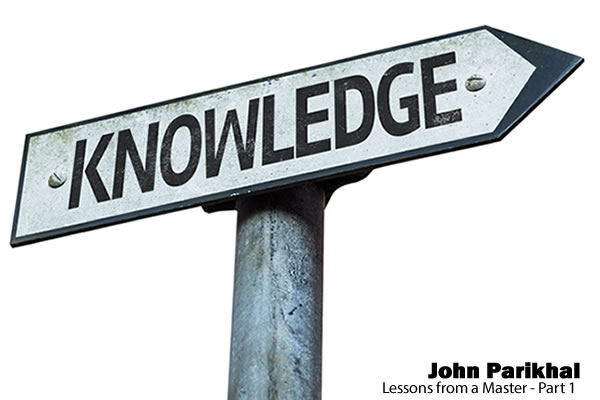John Parikhal – Lessons from a Master

One of the most important principles I’ve learnt over the years is to surround yourself with smart people.
John Parikhal is very smart.
John has consulted to and researched for over 1000 companies – including media, entertainment, packaged goods, and internet/online companies – in the US, Canada, Europe, Australia and South America.
 He has written over 300 articles on marketing, media, consumer behaviour and how to ‘cut through the clutter’ along with a book, ‘The Baby Boom: Making Sense of Our Generation at 40’. Most recently, he wrote the Branding chapter for Valerie Geller’s book ‘Beyond Powerful Radio’.
He has written over 300 articles on marketing, media, consumer behaviour and how to ‘cut through the clutter’ along with a book, ‘The Baby Boom: Making Sense of Our Generation at 40’. Most recently, he wrote the Branding chapter for Valerie Geller’s book ‘Beyond Powerful Radio’.
Along the way, he co-created a hit late night TV show for NBC, authored a couple of books, and wrote a radio show that ran for 5 years on NBC and around the world.
His focus is on helping businesses and people grow, by understanding human behaviour better and applying this knowledge in the appropriate way.
In 2013, he formally partnered with Philippe Denichaud to form Breakthrough Management to help companies and people survive, transform and grow by using proven business tools that help them ‘fix it right the first time’. Their blog is at www.btmgmt.net
He is also a partner with Taran Swan in Media Fix, which focuses on using deep consumer insights about digital behaviour to generate highly effective online results. Their blog’s at www.gomediafix.com.
Greg Smith: Describe your childhood. What was it like in your family’s household?
John Parikhal: We grew up poor, escaping from war-ravaged England to Canada. Since we had no TV, the radio was my window on the world. We had shortwave and AM so I listened to everything I could. I read any book I could get my hands on and mostly dreamed of getting away – to the South Seas, to New York, Chicago, or Paris, to all those places that had music, adventure, or entertainment. Like all kids of the 50s, we played outside in any kind of weather and basically came in when it got dark outside.
GS: I remember you talking about ‘The Music Formative Years – the music you hit when your hormones are changing’. At that age, what kind of music were you into?
JP: My hormone change coincided with my buying a used transistor radio with all my savings. A Sony. It was a miracle. I could listen to Top 40 from Toronto, New York, Chicago, and even Wheeling, West Virginia. I took it to my room and crawled under the covers with it, listening with a tiny earpiece when my parents thought I was sleeping. I was a huge fan of Roy Orbison, most of Phil Spector’s work (Shirelles, Ronettes, etc.), the Everly Brothers, and then as my hormones really took over – the Beatles, the British Invasion, Motown. Music was the most exciting thing in my life. The first album I bought was Marty Robbins. The second was Meet the Beatles.
GS: in the early 70’s you obtained a Master’s Degree at the University of Toronto as a student of the famous philosopher, Marshall McLuhan. For those who are not familiar with Marshall McLuhan, can you explain his teachings & what you learnt from him?
JP: McLuhan was a genius. Who saw the relationship between technology, culture, and art (writing, movies, plays, etc.) His theories were profound. One of the most important is still misunderstood – “The medium is the message”. His brilliant insight was that the content of the media (radio, TV, etc.) was not the message. Rather the medium itself changed the way you perceived – and you weren’t conscious of the fact that you no longer controlled your perception. As a result of these neural changes, he foresaw “sound-bite” politics and so many other world changers.
His basic teaching was that each new technology “steals” the content from the medium it replaces and then the “old” medium morphs to something new. Look at how radio stole the content of “live” theatre such as vaudeville, plays, musical performances, etc. when it came on the scene and then when TV came on the scene, it stole the same content from radio at which point radio morphed and stole its content from the juke-box.
McLuhan was not an easy guy to get along with. He was demanding, bullying, deliberately obscure, and, at the same time, making some of the most brilliant connections ever.
One thing that is not well known is that he and business genius, Peter Drucker, were best friends from the late 1930s.
GS: Dave Charles tells the story on how you met through your sister Irene. Dave asked for your help in putting together an application for a new FM radio station in Toronto. Two years later, you won the bid out of 14 applicants and that was the beginning of Q107 FM. This station exceeded all expectations and within two ratings books was equal to the legendary Album Rocker CHUM FM. Tell us about your time at Q107?
 JP: It was a wild and wonderful time. We weren’t expected to get the license. Allan Slaight, who put up the money and held the license in his name, was so certain we wouldn’t get it that he barely wanted to spend a dollar to send us to appear at the license hearing in Ottawa. Ironically, some years later, the money from the sale of Q107 allowed him to create the fortune that made him a billionaire.
JP: It was a wild and wonderful time. We weren’t expected to get the license. Allan Slaight, who put up the money and held the license in his name, was so certain we wouldn’t get it that he barely wanted to spend a dollar to send us to appear at the license hearing in Ottawa. Ironically, some years later, the money from the sale of Q107 allowed him to create the fortune that made him a billionaire.
We got really lucky that Allan didn’t trust me and Dave so he suggested we get a consultant which worked out perfectly – since it was legendary AOR pioneer, Lee Abrams. The three of us made magic.
Q107 was the first FM station to play 30% Canadian content so we broke a lot of bands. And we had huge rating getter shows such as Highwitness News (yes, the name says it all) on Saturday night, which attracted nearly 300,000 listeners and management didn’t even know it was on the air.
For me, I learned from two masters – Lee and Dave – what programming and promotion really were. I learned the ropes in the best possible place.
GS: What important lessons did you learn in those early days?
JP: I learned the importance of rotation and format, how to blend the predictable and surprising, to make everyone happy.
I learned how to really do news from Mark Daly, a genius at the spoken word. He showed me how to write brilliant leads, how to dig for a story when everyone else was waiting for someone else to do it, and how to write and deliver the copy at the highest level.
And, I was exposed to the important two-way street between radio and record promotion, how it could be a mutually beneficial experience that didn’t have to be adversarial.
Most important, watching Lee Abrams and later traveling with him, I learned how to be a radio consultant
GS: In 1978, you set up Joint Communications with Dave Charles. What made Joint Communications different from all the other radio consulting companies?
JP: In the beginning, we had a bigger vision than most others. We established a world-class research division out of the box, we had a strong relationship with Lee Abrams and Kent Burkhart, sharing information, ideas, etc. In the beginning we focused consulting on Canadian radio and let Lee have U.S. stations. However, we focused research on both Canada and the U.S. while developing a strong TV and print consulting business (MTV, VH1, Rolling Stone Magazine). Later we began consulting U.S. radio stations when there was such a great demand for our services.
GS: When you took on a new radio station client, what were the key questions you asked?
JP: The first question was always the same – what do you really know about your audience? After we could all answer that question, we asked about their clocks, criteria for selecting air talent, the relationship between sales and promotion – a lot of the basics. And, we always asked about marketing. What’s your “meaningful” difference from the competition? What’s your “position”? How will you communicate your message? When many of them didn’t know the answers, we began offering marketing as another service (I had been aiming for an advertising career after studying with McLuhan but then Q107 came along).

GS: Your ability to understand human behaviour through intricate research has enabled you to quickly identify emerging trends. Did this skill come naturally or was it honed over time?
JP: I was always good with math and numbers along with a very strong interest in why people behave the way they do. I got my B.A. in Economics and Business and my only A was in statistics (it helped my poker game). Then, I really honed my understanding of culture and trends while studying with McLuhan. So, one fed the other. My interest in Psychology came naturally and I was able to fuse it with strategy, numbers, and predictive modelling into a pretty powerful tool which got tested regularly. Which then allowed me to hone it even more.
GS: What are some of the common mistakes or false assumptions that programmers make?
JP: The biggest mistake it to confuse a format formula with a great radio station. These days, there are a set of “rules” that make radio predictable and boring, which is too bad. Sales and promotion merely support each other. The problem is compounded because programmers these days only talk to a few other programmers, who mostly agree with them. We’ve lost the conferences, trade papers, and the phone calls where ideas were shared, built on, discarded, and re-examined. No one talks much anymore. Very few listen to ideas from the on-air staff. The biggest mistake – being afraid to think outside the box.
In Part 2 with Lessons from a Master with John Parikhal, we step through some cases studies beyond positioning. Greg and John talk about the creation of the MIX format andsome of the key ingredients that programmers should keep in mind for making great radio.



HjgZ2U Your style is very unique in comparison to other people I ave read stuff from. I appreciate you for posting when you have the opportunity, Guess I all just bookmark this web site.